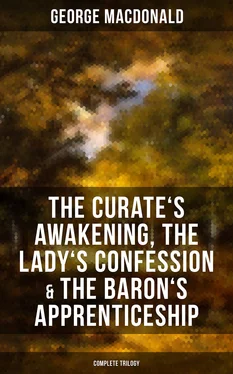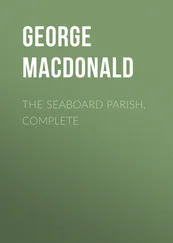What had come to him? He was not in the least like that for months after his appointment, and the change came all at once! Yes—it began with those extravagant notions about honesty in writing his own sermons! It might have been a sunstroke, but it took him far too early in the year for that! Softening of the brain it might be, poor fellow! Was not excessive vanity sometimes a symptom?—Poor fellow!
So said some. But others said he was a clever fellow, and long-headed enough to know that that sort of thing attracted attention, and might open the way to a benefice, or at least an engagement in London, where eloquence was of more account than in a dead-and-alive country place like Glaston, from which the tide of grace had ebbed, leaving that great ship of the church, the Abbey, high and dry on the shore.
Others again judged him a fanatic—a dangerous man. Such did not all venture to assert that he had erred from the way, but what man was more dangerous than he who went too far? Possibly these forgot that the narrow way can hardly be one to sit down in comfortably, or indeed to be entered at all save by him who tries the gate with the intent of going all the way—even should it lead up to the perfection of the Father in heaven. "But," they would in effect have argued, "is not a fanatic dangerous? and is not an enthusiast always in peril of becoming a fanatic?—Be his enthusiasm for what it may—for Jesus Christ, for God himself, such a man is dangerous—most dangerous! There are so many things, comfortably settled like Presumption's tubs upon their own bottoms, which such men would, if they could, at once upset and empty!"
Others suspected a Romanizing drift in the whole affair. "Wait until he gathers influence," they said, "and a handful of followers, and then you'll see! They'll be all back to Rome together in a month!"
As the wind took by the tail St. Peter's cock on the church spire and whirled it about, so did the wind of words in Glaston rudely seize and flack hither and thither the spiritual reputation of Thomas Wingfold, curate. And all the time, the young man was wrestling, his life in his hand, with his own unbelief; while upon his horizon ever and anon rose the glimmer of a great aurora, or the glimpse of a boundless main—if only he could have been sure they were no mirage of his own parched heart and hungry eye—that they were thoughts in the mind of the Eternal, and THEREFORE had appeared in his, even as the Word was said to have become flesh and dwelt with men! The next moment he would be gasping in that malarious exhalation from the marshes of his neglected heart—the counter-fear, namely, that the word under whose potent radiance the world seemed on the verge of budding forth and blossoming as the rose, was TOO GOOD TO BE TRUE.
"Yes, much too good, if there be no living, self-willing Good," said Polwarth one evening, in answer to the phrase just dropped from his lips. "But if there be such a God as alone could be God, can anything be too good to be true?—too good for such a God as contented Jesus Christ?"
At one moment he was ready to believe everything, even to that strangest, yet to me right credible miracle of the fish and the piece of money, and the next to doubt whether man had ever dared utter the words, "I and the Father are one." Tossed he was and tormented in spirit, calling even aloud sometimes to know if there was a God anywhere hearing his prayer, sure only of this, that whatever else any being might be, if he heard not prayer, he could not be the God for whom his soul cried and fainted. Sometimes there came to him, it is true, what he would gladly have taken for an answer, but it was nothing more than the sudden descent of a kind of calmness on his spirit, which, for aught he could tell, might be but the calm of exhaustion. His knees were sore with kneeling, his face white with thinking, his eyes dim with trouble; for when once a man has set out to find God, he must find him or die. This was the inside reality whose outcome set the public of Glaston babbling. It was from this that George Bascombe magisterially pronounced him a hypochondriac, worrying his brain about things that had no existence—as George himself could with confidence testify, not once having seen the sight of them, heard the sound of them, or imagined in his heart that they ought to be, or even that they might possibly be. He pronounced indeed their existence inconsistent with his own. The thought had never rippled the grey mass of his self-satisfied brain that perhaps there was more of himself than what he counted he himself yet knew, and that possibly these matters had a consistent relation with parts unknown. Poor, poverty-stricken Wingfold!—actually craving for things beneath Bascombe's notice! actually crying for something higher and brighter than the moon! How independent was George compared with Thomas!—content to live what he called his life, be a benefactor to men, chiefly in ridding their fancies of the goblins of aspiration, then die his death, and have done with the business; while poor misguided, weak-brained, hypochondriacal Thomas could be contented with nothing less than the fulfilment of the promise of a certain man who perhaps never existed: "The Father and I will come to him and make our abode with him."
Yet Thomas too had his weakness for the testimony of the senses. If he did not, like George, refuse to believe without it, he yet could not help desiring signs and wonders that he might believe. Of this the following poem was a result, and I give it the more willingly because it will show how the intellectual nature of the man had advanced, borne on the waves that burst from the fountains of the great deep below it.
O Lord, if on the wind, at cool of day,
I heard one whispered word of mighty grace;
If through the darkness, as in bed I lay,
But once had come a hand upon my face;
If but one sign that might not be mistook,
Had ever been, since first thy face I sought,
I should not now be doubting o'er a book,
But serving thee with burning heart and thought.
So dreams that heart. But to my heart I say,
Turning my face to front the dark and wind:
Such signs had only barred anew His way
Into thee, longing heart, thee, wildered mind.
They asked the very Way, where lies the way;
The very Son, where is the Father's face;
How he could show himself, if not in clay,
Who was the lord of spirit, form, and space.
My being, Lord, will nevermore be whole
Until thou come behind mine ears and eyes,
Enter and fill the temple of my soul
With perfect contact—such a sweet surprise—
Such presence as, before it met the view,
The prophet-fancy could not once foresee,
Though every corner of the temple knew
By very emptiness its need of thee.
When I keep ALL thy words, no favoured some—
Heedless of worldly winds or judgment's tide,
Then, Jesus, thou wilt with thy Father come—
O ended prayers!—and in my soul abide.
Ah long delay!—ah cunning, creeping sin!
I shall but fail and cease at length to try:
O Jesus, though thou wilt not yet come in,
Knock at my window as thou passest by.
CHAPTER VI.
THE LINEN-DRAPER.
Table of Contents
But there was yet another class amongst those who on that second day heard the curate testify what honestly he might, and no more, concerning Jesus of Nazareth. So far as he learned, however, that class consisted of one individual.
On the following Tuesday morning he went into the shop of the chief linen-draper of Glaston, for he was going to a funeral, and wanted a new pair of gloves that he might decline those which would be offered him. A young woman waited on him, but Mr. Drew, seeing him from the other end of the shop, came and took her place. When he was fitted, had paid for his purchase, and was turning to take his leave, the draper, with what appeared a resolution suddenly forced from hesitation, leaned over the counter and said:
Читать дальше












